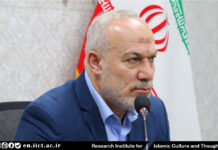Hussein Ramazani Kheradmardi
Abstract
The present work, “Khājeh Nasīr al-Dīn Tūsī’s perspective on political management”, was initiated based upon the assumption that Khājeh has adopted a two-dimensional and exalted approach towards political management.
To examine and explain Khājeh’s outlook on political management, the principles of political management from his point of view are looked at in the first chapter. It was found out that from his viewpoint, political management is rooted in the quiddity of communities, in particular political community or government. As a result, we turned to Knowledge of man and society from his perspective; Khājeh sees man as a being created by God that seeks good and felicity on his way from Beginning to End. Such good and felicity is attainable for man only through social life and establishment of a political society, which in turn requires political management.
In the second chapter, the foundations of political management from Khājeh’s perspective are studied; he envisages two aspects for political management: theoretical and practical. He considers the theoretical aspect as the basis and the practical one as its ultimate result. Having explained the goal and pillars of political management, he classified politics into different types; in a broad classification there are two types: deficient [imperfect] politics and perfect [virtuous] politics. It is only perfect politics which he accepts as political management, and there are certain qualities and conditions he specifies for its agent, namely a political manager [governor]. These qualities and conditions will be dealt with later on.
In the third chapter the howness of political management from Khājeh’s viewpoint is studied. In this chapter, the issue of “Tadabbur[1]” i.e. political policy-making (including goals, principles and methodology) as well as the issue of “Tadbīr[2]” i.e. political planning (including plans for safeguarding the government and putting its affairs in order) are discussed within the framework of political management. And finally the question of “administration” regarding political agency, focusing on people-centeredness, adherence to laws and furthering policies, are presented within the framework of political management.
The present book is merely an attempt to come to a deeper understanding of Khājeh’s viewpoints regarding political management.
[1] regulation
[2] management












